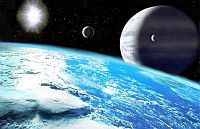 The oceans could indeed be older than the sun. A team of scientists from the University of Michigan now believe that up to half the water on our planet is older than the sun. Earlier theories had assumed that interstellar ice particles evaporated with the formation of Earth and reformed later to create the oceans. Now, these scientists have calculated that if the old theory was valid, that the amount of deuterium found in terrestrial water would be far lower than it is. Deuterium is an isotope of hydrogen that has an extra neutron attached. The only explanation they have found for the higher levels of deuterium observed is if more of the interstellar ice particles helped form the world’s oceans directly. They calculate that as much as 50% of the earth’s water might come from these ice particles, which have higher levels of deuterium. This might suggest that water on distant planets is far more common than previously thought.
The oceans could indeed be older than the sun. A team of scientists from the University of Michigan now believe that up to half the water on our planet is older than the sun. Earlier theories had assumed that interstellar ice particles evaporated with the formation of Earth and reformed later to create the oceans. Now, these scientists have calculated that if the old theory was valid, that the amount of deuterium found in terrestrial water would be far lower than it is. Deuterium is an isotope of hydrogen that has an extra neutron attached. The only explanation they have found for the higher levels of deuterium observed is if more of the interstellar ice particles helped form the world’s oceans directly. They calculate that as much as 50% of the earth’s water might come from these ice particles, which have higher levels of deuterium. This might suggest that water on distant planets is far more common than previously thought.
Up to half of Earth’s water is older than the sun
Instead, interstellar ice must have made its way into planets, moons and comets intact. Cleeves and her colleagues calculate that as much as half the water in Earth’s oceans and possibly all of the water found in comets came from this ancient source.
Ice isn’t the only thing out there in interstellar space – there’s also organic material, says Fred Ciesla, a planetary scientist at the University of Chicago. If this interstellar stuff went into the formation of our solar system’s planets, then it probably forms part of planets around other stars too – boosting the chances that many planetary systems formed with the raw ingredients for life.
“It provides the opportunity for organic materials, and the things that are important to the formation of life, to at least be accessible to all planets out there,” says Ciesla. “Whether or not it forms into aliens and little green men and women is a whole other story.”

From an early article, older than the solar system, including the sun.